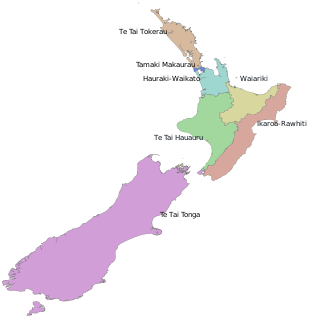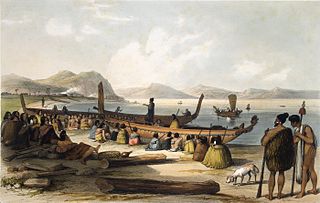The Alliance was a left-wing political party in New Zealand. It was formed at the end of 1991 by the linking of four smaller parties. The Alliance positioned itself as a democratic socialist alternative to the centre-left New Zealand Labour Party. It was influential throughout the 1990s, but suffered a major setback after its founder and leader, Jim Anderton, left the party in 2002, taking with him several of its members of parliament (MPs). After the remaining MPs lost their seats in the 2002 general election, some commentators predicted the demise of the party.
Ruth Richardson is a New Zealand retired politician of the National Party who served as Minister of Finance from 1990 to 1993. Her 1991 budget, which she dubbed the "Mother of all Budgets", formed the catalyst of her economic reforms known in the media as "Ruthanasia".

The 1999 New Zealand general election was held on 27 November 1999 to determine the composition of the 46th New Zealand Parliament. The governing National Party, led by Prime Minister Jenny Shipley, was defeated, being replaced by a coalition of Helen Clark's Labour Party and the smaller Alliance. This marked an end to nine years of the Fourth National Government, and the beginning of the Fifth Labour Government which would govern for nine years in turn, until its loss to the National Party in the 2008 general election. It was the first New Zealand election where both major parties had female leaders.

Deborah Cleland Grey, is a Canadian former Member of Parliament from Alberta for the Reform Party of Canada, the Canadian Alliance, and the Conservative Party of Canada. She was the first female Leader of the Opposition in Canadian history. She currently serves on the advisory board of the Leaders' Debates Commission.

The Democratic Representative Caucus, also called the Democratic Representative Association, was a parliamentary group in the 37th Canadian Parliament consisting of Members of Parliament who left the Canadian Alliance in 2001 in protest against the leadership of Stockwell Day.

The 1993 New Zealand general election was held on 6 November 1993 to determine the composition of the 44th New Zealand Parliament. Voters elected 99 members to the House of Representatives, up from 97 members at the 1990 election. The election was the last general election to use the first-past-the-post electoral system, with all members elected from single-member electorates.

In New Zealand politics, Māori electorates, colloquially known as the Māori electorates, are a special category of electorate that until 1967 gave reserved positions to representatives of Māori in the New Zealand Parliament. Every area in New Zealand is covered by both a general and a Māori electorate; as of 2020, there are seven Māori electorates. Since 1967 any candidate of any ethnicity has been able to stand in a Maori electorate. Candidates now do not have to be Māori, or even on the Māori roll. Voters however who wish to vote in a Māori electorate have to register as a voter on the Māori roll and need to declare they are of Māori descent.

The 45th New Zealand Parliament was a term of the Parliament of New Zealand. Its composition was determined by the 1996 election, and it sat until the 1999 election.
Frank Grover is a former New Zealand politician. He was an MP from 1996 to 1999, representing first the Alliance and then the Christian Heritage Party in the House of Representatives.

The 44th New Zealand Parliament was a term of the Parliament of New Zealand. Its composition was determined by the 1993 elections, and it sat until the 1996 elections.
Michael Laws is a politician, broadcaster and writer/columnist from New Zealand.

Māori politics is the politics of the Māori people, who were the original inhabitants of New Zealand and who are now the country's largest minority. Before the arrival of Pākehā (Europeans) in New Zealand, Māori society was based largely around tribal units, and chiefs provided political leadership. With the British settlers of the 19th century came a new British-style government. From the outset, Māori sought representation within this government, seeing it as a vital way to promote their people's rights and improve living standards. Modern Māori politics can be seen as a subset of New Zealand politics in general, but has a number of distinguishing features, including advocacy for indigenous rights and Māori sovereignty. Many Māori politicians are members of major, historically European-dominated political parties, but several Māori parties have been formed.

The 43rd New Zealand Parliament was a term of the Parliament of New Zealand. Its composition was determined by the 1990 elections, and it sat until the 1993 elections.

New Zealanders speak colloquially of waka-jumping when a member of Parliament (MP) switches political party between elections, taking their parliamentary seat with them and potentially upsetting electoral proportionality in the New Zealand Parliament.
Gilbert Colin Myles is a former New Zealand politician who entered Parliament for the National Party in 1990, then split from the party in 1991 and sat as an independent, before representing the Liberal Party, the Alliance and the New Zealand First party.
The Fourth National Government of New Zealand was the government of New Zealand from 2 November 1990 to 27 November 1999. Following electoral reforms in the 1996 election, Jim Bolger formed a coalition with New Zealand First. Following Bolger's resignation, the government was led by Jenny Shipley, the country's first female Prime Minister, for the final two years.

Northland is a New Zealand parliamentary electorate, returning one Member of Parliament to the New Zealand House of Representatives. The electorate was established for the 1996 election. It was represented by National Party MP John Carter from 1996 to 2011, and then National's Mike Sabin until his resignation on 30 January 2015. The by-election in March 2015 was won by New Zealand First party leader Winston Peters. Peters was defeated by National's Matt King in the 2017 general election. King in turn was defeated by the Labour Party's Willow-Jean Prime in the 2020 general election, who became the first Labour MP elected for the area since the party won the predecessor electorate Bay of Islands in 1938.
Hamish MacIntyre is a former New Zealand politician who at various times represented the National Party, Liberal Party, and the Alliance.
Cameron John Campion was a New Zealand politician of the National Party.








